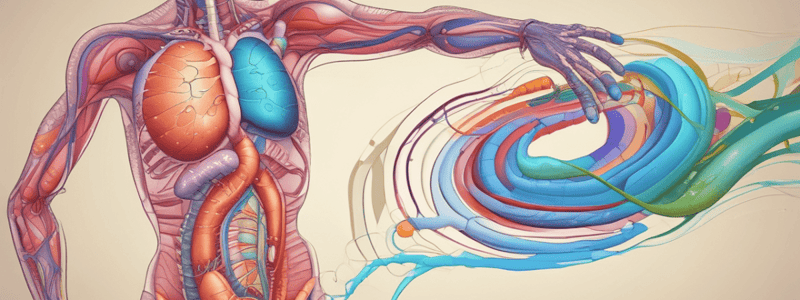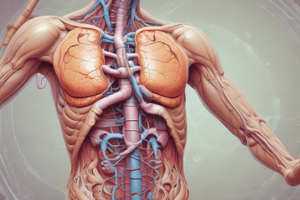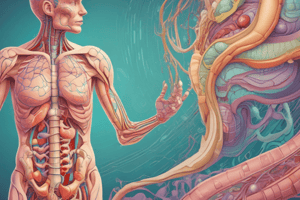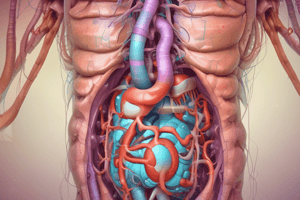Podcast
Questions and Answers
What is the primary function of retropulsion in the stomach?
What is the primary function of retropulsion in the stomach?
During which phase of gastric acid secretion is the majority of acid produced?
During which phase of gastric acid secretion is the majority of acid produced?
What is the primary function of HCO3- in gastric mucus?
What is the primary function of HCO3- in gastric mucus?
What is the term for the process by which food is propelled back into the stomach for further breakdown?
What is the term for the process by which food is propelled back into the stomach for further breakdown?
Signup and view all the answers
What is the pH of the stomach contents during the fasting state?
What is the pH of the stomach contents during the fasting state?
Signup and view all the answers
What is the primary function of the mucus layer in the stomach?
What is the primary function of the mucus layer in the stomach?
Signup and view all the answers
What is the term for the complex of tubulovesicles and intracellular canaliculi in the parietal cell?
What is the term for the complex of tubulovesicles and intracellular canaliculi in the parietal cell?
Signup and view all the answers
What is the primary function of blood flow in the stomach?
What is the primary function of blood flow in the stomach?
Signup and view all the answers
Which of the following salivary secretions plays a crucial role in breaking down complex carbohydrates?
Which of the following salivary secretions plays a crucial role in breaking down complex carbohydrates?
Signup and view all the answers
What is the primary function of the gastric mucosal barrier?
What is the primary function of the gastric mucosal barrier?
Signup and view all the answers
Which of the following phases of acid secretion is stimulated by the sight and smell of food?
Which of the following phases of acid secretion is stimulated by the sight and smell of food?
Signup and view all the answers
What is the primary function of pancreatic juice?
What is the primary function of pancreatic juice?
Signup and view all the answers
Which of the following hormones is released in response to the presence of acid in the duodenum?
Which of the following hormones is released in response to the presence of acid in the duodenum?
Signup and view all the answers
What is the primary function of acinar cells in the pancreas?
What is the primary function of acinar cells in the pancreas?
Signup and view all the answers
Which of the following is NOT a function of saliva?
Which of the following is NOT a function of saliva?
Signup and view all the answers
What is the primary function of the gastric mucosal barrier?
What is the primary function of the gastric mucosal barrier?
Signup and view all the answers
Which of the following textbooks is NOT a recommended resource for MBBS Year 1 Gastrointestinal Lectures?
Which of the following textbooks is NOT a recommended resource for MBBS Year 1 Gastrointestinal Lectures?
Signup and view all the answers
What is the role of intrinsic factor in the stomach?
What is the role of intrinsic factor in the stomach?
Signup and view all the answers
What is the primary stimulant of HCl secretion by parietal cells?
What is the primary stimulant of HCl secretion by parietal cells?
Signup and view all the answers
What is the structure of the glandular stomach epithelium?
What is the structure of the glandular stomach epithelium?
Signup and view all the answers
What is the function of surface mucous cells in the stomach?
What is the function of surface mucous cells in the stomach?
Signup and view all the answers
What is the result of the structural changes in parietal cells during HCl secretion?
What is the result of the structural changes in parietal cells during HCl secretion?
Signup and view all the answers
What is the primary component of gastric juice?
What is the primary component of gastric juice?
Signup and view all the answers
What is the location of the absorption of vitamin B12?
What is the location of the absorption of vitamin B12?
Signup and view all the answers
What is the primary function of the CCK2 receptor in the ECL cell?
What is the primary function of the CCK2 receptor in the ECL cell?
Signup and view all the answers
Which of the following neurotransmitters is involved in the physiological stimulation of gastric acid secretion?
Which of the following neurotransmitters is involved in the physiological stimulation of gastric acid secretion?
Signup and view all the answers
What is the role of the ECL cell in the regulation of gastric acid secretion?
What is the role of the ECL cell in the regulation of gastric acid secretion?
Signup and view all the answers
Which receptor is localized on the parietal cell and involved in the regulation of gastric acid secretion?
Which receptor is localized on the parietal cell and involved in the regulation of gastric acid secretion?
Signup and view all the answers
What is the primary source of gastrin in the gastric mucosa?
What is the primary source of gastrin in the gastric mucosa?
Signup and view all the answers
What is the effect of histamine on parietal cells?
What is the effect of histamine on parietal cells?
Signup and view all the answers
What is the mechanism by which omeprazole inhibits gastric HCl secretion?
What is the mechanism by which omeprazole inhibits gastric HCl secretion?
Signup and view all the answers
What is the primary function of pancreatic juice?
What is the primary function of pancreatic juice?
Signup and view all the answers
What is the primary function of the intestinal phase of acid secretion?
What is the primary function of the intestinal phase of acid secretion?
Signup and view all the answers
What is the composition of pancreatic juice?
What is the composition of pancreatic juice?
Signup and view all the answers
What is the primary function of lipase in pancreatic juice?
What is the primary function of lipase in pancreatic juice?
Signup and view all the answers
What is the rate of protein synthesis in the pancreas?
What is the rate of protein synthesis in the pancreas?
Signup and view all the answers
What is the primary function of cholecystokinin?
What is the primary function of cholecystokinin?
Signup and view all the answers
What is the primary function of trypsinogen in pancreatic juice?
What is the primary function of trypsinogen in pancreatic juice?
Signup and view all the answers
Study Notes
MBBS Year 1 Gastrointestinal Lectures
- Lectures cover the overview of the digestive system, digestion and absorption of nutrients, salivary, gastric, and pancreatic secretions, bile and biliary system, and motility of the gut.
Salivary Secretions
- Salivary glands produce saliva, which has several functions:
- Lubricates food for easy swallowing
- Aids in chewing and digestion
- Helps in oral cavity cleanliness
- Has antibacterial properties
- Salivary secretion is controlled by the nervous system and hormones.
- Factors influencing salivary secretion include:
- Parasympathetic stimulation
- Sympathetic stimulation
- Hormonal stimulation
- Reflex stimulation
Gastric Acid Secretion
- Gastric acid secretion is divided into basal (fasting) and stimulated (post-prandial) phases.
- The three phases of gastric acid secretion are:
- Cephalic phase: triggered by the sight, smell, and taste of food
- Gastric phase: stimulated by the presence of food in the stomach
- Intestinal phase: influenced by the presence of food in the small intestine
- Mucus and bicarbonate secretion create a gastric mucosal barrier, protecting the stomach from acid and enzymes.
- The stomach epithelium undergoes structural changes during HCl secretion, forming a markedly increased tubulovesicular system for proton secretion.
Gastric Mucosal Defense
- The gastric mucosal barrier consists of:
- Mucus layer
- HCO3- secretion
- Tight junctions
- This barrier protects the stomach from acid and enzymes, maintaining a neutral pH.
Pancreatic Secretion
- Pancreatic juice has a physiological function of:
- Neutralizing duodenal content
- Aiding in protein digestion
- Factors causing release of secretin and cholecystokinin include:
- Presence of acid in the duodenum
- Presence of fats in the small intestine
- These intestinal hormones modify the composition of pancreatic juice, increasing HCO3- secretion and enzyme production.
Pancreatic Juice Composition
- Pancreatic juice is composed of:
- Aqueous component rich in HCO3
- Enzyme component
- Proteolytic enzymes (trypsinogen, chymotrypsinogen, procarboxypolypeptidase, ribonuclease, deoxyribonuclease)
- Amylase (breaks down starch and glycogen)
- Lipase (hydrolyzes neutral fat into glycerol and fatty acids)
Studying That Suits You
Use AI to generate personalized quizzes and flashcards to suit your learning preferences.
Description
A comprehensive review of the digestive system, covering digestion, absorption, and physiology. Topics include salivary, gastric, and pancreatic secretions, bile and biliary system, and motility of the gut.



